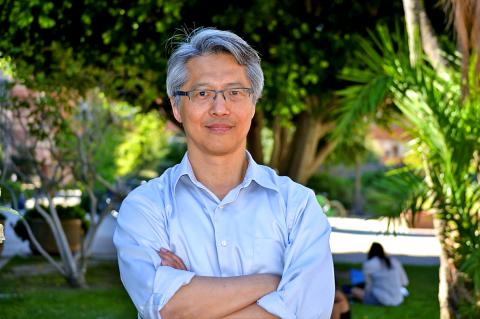James C. Liao (廖俊智) yesterday was tapped by President Tsai Ing-wen (蔡英文) to head Academia Sinica, as the Presidential Office promised to maintain the professionalism and neutrality of the nation’s premier academic institution.
Presidential Office spokesperson Alex Huang (黃重諺) said Tsai, along with Vice President Chen Chien-jen (陳建仁) and Presidential Office Deputy Secretary-General Liu Chien-hsin (劉建炘), had held a video conference with Liao, who was still in Los Angeles, before making the decision.
Huang said that Tsai made clear to Liao that she had chosen him out of respect for the Academia Sinica’s vote and to put to rest claims questioning Liao’s legitimacy to the position due to controversy over the organization’s voting for candidates to the position.

Photo courtesy of the Academia Sinica
The voting process was controversial due to moving to amend the regulations for nomination on the day of voting and premature leaking of the list of candidates.
When asked by Tsai if he was still willing to take the position, Liao responded that he would gladly take responsibility for leading the institution and that he hoped to contribute to Taiwan during his term as Academia Sinica president.
Huang said that Tsai emphasized that because Academia Sinica is the nation’s most prestigious academic institution, the Presidential Office is offering to do everything it can to help maintain the professionalism and neutrality of the organization.
Under the leadership of a new president, it is hoped that the Academia Sinica will return to normal and continue to produce high-quality academic findings, Huang said.
The Presidential Office is to officially notify Academia Sinica of Tsai’s decision shortly, and is to announce the official appointment in the coming days, Huang said.
The Presidential Office said that Liao: received the Presidential Green Chemistry Challenge Award in 2010; became a member of the National Academy of Engineering in the US and received the ENI Award for Renewable Energies in 2013; received the NAS Industrial Application of Science award from the US National Academy of Sciences in 2014; became a member of the US National Academy of Sciences last year; and became a member of the US National Academy of Inventors this year.
Liao received a doctorate degree in chemical engineering from the University of Wisconsin-Madison in 1987 and is currently the chair of bioengineering and chemical and biomolecular engineering at the Henry Samueli School of Engineering and Applied Science at the University of California, Los Angeles.

Taiwan has received more than US$70 million in royalties as of the end of last year from developing the F-16V jet as countries worldwide purchase or upgrade to this popular model, government and military officials said on Saturday. Taiwan funded the development of the F-16V jet and ended up the sole investor as other countries withdrew from the program. Now the F-16V is increasingly popular and countries must pay Taiwan a percentage in royalties when they purchase new F-16V aircraft or upgrade older F-16 models. The next five years are expected to be the peak for these royalties, with Taiwan potentially earning

STAY IN YOUR LANE: As the US and Israel attack Iran, the ministry has warned China not to overstep by including Taiwanese citizens in its evacuation orders The Ministry of Foreign Affairs (MOFA) yesterday rebuked a statement by China’s embassy in Israel that it would evacuate Taiwanese holders of Chinese travel documents from Israel amid the latter’s escalating conflict with Iran. Tensions have risen across the Middle East in the wake of US and Israeli airstrikes on Iran beginning Saturday. China subsequently issued an evacuation notice for its citizens. In a news release, the Chinese embassy in Israel said holders of “Taiwan compatriot permits (台胞證)” issued to Taiwanese nationals by Chinese authorities for travel to China — could register for evacuation to Egypt. In Taipei, the ministry yesterday said Taiwan

Taiwan is awaiting official notification from the US regarding the status of the Agreement on Reciprocal Trade (ART) after the US Supreme Court ruled US President Donald Trump's global tariffs unconstitutional. Speaking to reporters before a legislative hearing today, Premier Cho Jung-tai (卓榮泰) said that Taiwan's negotiation team remains focused on ensuring that the bilateral trade deal remains intact despite the legal challenge to Trump's tariff policy. "The US has pledged to notify its trade partners once the subsequent administrative and legal processes are finalized, and that certainly includes Taiwan," Cho said when asked about opposition parties’ doubts that the ART was

If China chose to invade Taiwan tomorrow, it would only have to sever three undersea fiber-optic cable clusters to cause a data blackout, Jason Hsu (許毓仁), a senior fellow at the Hudson Institute and former Chinese Nationalist Party (KMT) legislator, told a US security panel yesterday. In a Taiwan contingency, cable disruption would be one of the earliest preinvasion actions and the signal that escalation had begun, he said, adding that Taiwan’s current cable repair capabilities are insufficient. The US-China Economic and Security Review Commission (USCC) yesterday held a hearing on US-China Competition Under the Sea, with Hsu speaking on